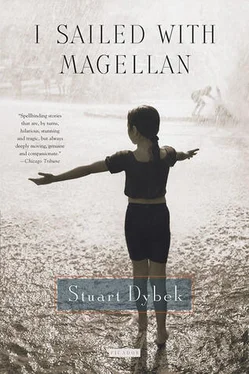She said she didn’t know what kind of novel it was, because she — then she changed that to we —were only on Chapter One.
She said that without the least bit of irony, and though that frightened me a little, I liked her all the more for it.
“You may have noticed we have different thought processes,” she said.
“How so?”
“I love the connections, the overview of novels. And you … you think that life is a Great Moments collection. Look at all these undernourished-looking books of poetry,” she said, gesturing to where my typewriter sat on the platform I’d erected on the worn carpet from a stack of library books. “How can you type sitting on the floor, anyway?”
“I’m living my life like a haiku,” I said. “Syllable by syllable.”
“The best teacher I ever had in high school once wrote on one of my papers ‘Sarcasm is the final defense of the weak.’ And this saxophone — do you ever play it or is it just for decor?”
“I’m practicing to be a musician of silence,” I told her, quoting a line I’d read just the night before in a book of translations of Mallarmé.
She merely gave me one of those looks that says if there’s one thing more tedious than being a bore it’s being a pretentious asshole.
I knew she was impressed.
We’d met in the New World, a socialist bookstore that had just moved up to Rogers Park after a mail bomb had blown out the windows in its former downtown location. Stosh, who frequented the place, had told me that the owner, Lew Merskin, had fought in the Spanish Civil War. I’d wandered in on the evening of the first day I’d moved back to the city, and meeting her there seemed like a good omen.
Her name was Melody — but after our discussion about life as a Russian novel, I began calling her Natasha, a name she seemed fond of. She had the soulful eyes to carry it off, though that quality might have been enhanced by her violet eye shadow. Her face was framed by dark hair, wisps of which she constantly brushed away from her eyes and away from our mouths when we kissed.
I didn’t have a phone and would never know when she was coming over, or if she was coming at all. The day we’d met I’d told her where I was living, never expecting her to drop by, especially when she didn’t even offer her phone number. All she’d told me was that she lived in Evanston.
Later, she mentioned that she was attending Northwestern, which I’d assumed, somehow, but I never found out where she was living, whether alone or with a boyfriend, in a dorm, or at a sorority house she was embarrassed about. Or was she slumming and didn’t want her friends to know? Once, when I asked her how I could get in touch, she said, “Let’s just leave it this way for a while — both free, okay?”
“Fine by me,” I said.
The lobby buzzer didn’t work. I lived on the top floor, down a dingy corridor dark with burned-out overhead bulbs. There’d be a knock at my door — I never quite learned to recognize her knock — and a chemical change too immediate to control would surge through me. If it turned out to be merely one of my friends, Stosh or Doolin, I’d feel foolish standing there at the door with a pounding heart. But sometimes, usually in midafternoon when she’d cut class and take the train from Evanston, it would be Melody, looking Natasha-like in the black raincoat she wore whether it was raining or not. Jeans or a denim skirt, blouse opened at the throat, and underneath a colored bra — violet, ivory, mint, smoke, rose, Capri. A bra from what she referred to as her Italian underwear hobby, which she blamed on the corrupting childhood experience of collecting wardrobes for her Barbie. Whatever the color of the day, she took to dangling her bras from my saxophone as if it was a coatrack, not a horn.
When the flop-out bed would begin twanging melodiously beneath us, the old woman in the apartment below would beat the ceiling with what I guessed was the handle of a broom.
“I wonder what chapter she’s on?” I said.
“That’s sad, not funny,” Natasha said.
“At least my typing late at night never seems to bother her.”
“And what is it that you’re typing so late?”
“Maybe my diary.”
“Oh really, and do you write about us? About this? How do you describe it?”
“Well, I usually start out, ‘Dear Diary …’”
“I wouldn’t know what words to use,” she said. “Certainly not the clinical ones, but not the dirty ones either. And certainly not the bodice rippers. Throb or tumescent— God, that’s truly disgusting.”
“I thought diaries were supposed to be private, like confession.”
“No fair. I share my stories with you.”
It was true, she’d tell me stories — strange, amazing stories like the one about her first real sexual experience, when she was a freshman in high school, in a suburb outside Cleveland. It happened with a young man named Armando, who was painting the condo where she lived with her family. Not that she and Armando actually did anything much but talk, she explained, but the things they talked about were a sin. Simply talking with Armando was more intensely erotic than what she called mashing, which came later with high school boys. He was the first man who made her realize that men could be beautiful, and once she saw that, Armando was all she could think about.
He’d tease her, refer to her as Lolita or Ms. Jailbait, and then his voice would drop and he’d begin a litany of what he’d like to do if she were legal. Once, when he was painting the inside hallway, she brought him an ice-cold Coke and he climbed down from his ladder — the way she described it made it sound like Michelangelo descending from the ceiling of the Sistine Chapel — and took a long swig, then kissed her with his ice-cold lips. It was the first kiss for which she opened her mouth. Lips still cool, he kissed her throat and down her body. It was summer, she was dressed in a halter top and shorts.
“If you were a woman, this is how I’d kiss your breasts,” Armando said, kissing gently through her clothes. “And this is how I’d kiss you here,” he said, sliding to his knees.
“Jeez, what a pervert,” I said.
There was more. She woke the last morning the painters were there to find that Armando had lowered the scaffold outside to the level of her bedroom window. He perched there, five stories up, looking in. “I was watching you sleep,” he said. She remembered that she was wearing shorty pajamas of a nearly transparent cotton.
“What would you do now if I wasn’t here?” he asked.
She stood before the window, yawned, stretched, and then unbuttoned her pajama top.
“I am a woman,” she told him.
“Thank you,” Armando whispered. “I’ll always remember you in the morning light.” Then, he reached in past her curtains with his paintbrush and very lightly drew a streak of white paint down her chest.
She stood for what seemed an hour under the shower letting the water slowly wear the paint from her skin.
All through her next year in high school, she told me, she’d unexpectedly feel that streak of paint, and feel the almost irrepressible urge to open her blouse and see if it had reappeared — an urge so strong that if she was in class she’d slip her fingers between the buttons, touch her skin, and check her fingertips for paint. And if she was at home, she’d stand before the mirror and unbutton her blouse, pretending that Armando was at the window, watching her.
Sometimes, looking into the mirror, she told me, she’d be startled to notice that tears were running down her face.
“Why were you crying?” I asked.
“Because I’d heard that while painting another building Armando fell to his death.”
Читать дальше












